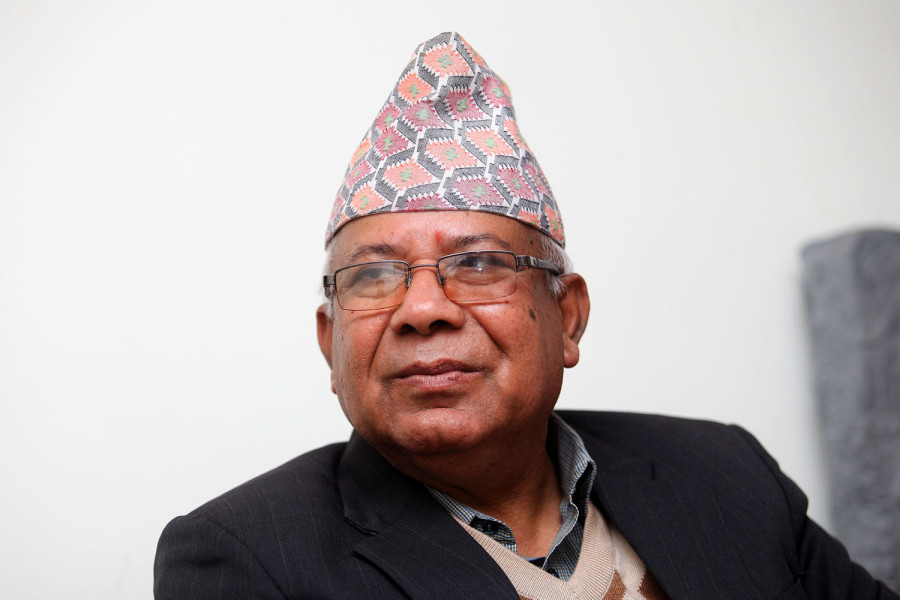Politics
Nepal’s note of dissent is likely to reignite conflict within ruling party
Nepal has once again brought up the ‘one person, one responsibility’ debate, targeting Co-chair KP Sharma Oli.
Anil Giri
Infighting in the ruling Nepal Communist Party is likely to snowball in the coming days, as senior leader Madhav Kumar Nepal has launched an attack on the party leadership, especially Co-chair KP Sharma Oli. Nepal’s dissatisfaction emanates from Oli’s decision, backed by Co-chair Pushpa Kamal Dahal, to elevate Jhala Nath Khanal to the third position, relegating Nepal to the fourth.
Nepal on Tuesday registered a note of dissent at the party secretariat and demanded strict implementation of the ‘one person, one responsibility’ principle in the party, bringing the once widely debated issue back to life.
[Related Story: Row lingers in ruling party over ‘one leader, one responsibility’ issue]
Nepal has said the party should stop piling responsibilities on some party leaders while keeping others idle. Responsibilities should be divided among all—from party chairs to cadres at the grassroots level, Nepal demanded in his note of dissent.
As Oli is leaving for Singapore for medical treatment on Thursday, it is unlikely that Nepal’s grievances will be heard immediately. A meeting of the secretariat has been scheduled for Wednesday but there is no likelihood of discussion on Nepal’s note of dissent, a party leader told the Post on condition of anonymity, citing the seriousness of the matter.
After months of wrangling, the ruling party’s sudden decision to appoint the leadership of 32 party departments last week was largely seen as a victory for Oli, who over the past few weeks has managed to bring almost all former CPN-UML leaders as well as Dahal into his fold. Oli, in agreement with Dahal, not only handed over the Organisation Department to Bamdev Gautam, but also elevated him to the post of vice-chairman, ignoring the party statute.
[Related Story: Ruling party finally picks its department heads]
As though that was not enough, to Nepal’s chagrin, Oli relegated him to the fourth place, weakening his clout in the secretariat.
More than the position and ranking, Nepal is in favour of running the party under a proper system, said Somnath Pandey, a central committee member who has close relations with Nepal.
“There should be an institutional framework and mechanism,” Pandey told the Post. “Whether one agrees or disagrees, there is a competition going on in the top leadership, and the gap between Nepal and Oli is widening.”
A few months ago, Dahal, in a desperate bid to create space for himself in the wake of Oli’s total control over the party and the government, was in talks with Nepal, stoking suspicion in the Oli camp.
[Related Story: Growing camaraderie between Dahal and Nepal stokes concerns in the Oli faction]
Factionalism was growing in the year-old Nepal Communist Party (NCP), with former CPN-UML and Maoist leaders vertically divided over ideological issues. Both factions were vying to lead the School Department, an important unit in a communist party.
When Oli was in Davos, Switzerland in January, a meeting between Dahal, Nepal and other senior leaders, including Gautam and Narayan Kaji Shrestha, was held in Lalitpur. According to party insiders, the leaders had heavily criticised Oli for his style of running the party and the government.
The Oli camp, according to leaders, was working not only to break Dahal’s manoeuvrings but also to sideline Nepal.
After Dahal swiftly decided to side with Oli last week, as has been evidenced in some crucial decisions—from the appointment of department chiefs to Gautam’s elevation to the post of vice-chair and Khanal’s promotion—Nepal on Tuesday expressed his anger in the form of note of dissent, a leader close to Nepal told the Post.
In his note, Nepal also said that he has always firmly believed that a communist party should operate as per the party charter, and should follow the criteria, decorum and a committee system.
Some party meetings have not convened on time and decisions are not implemented, Nepal said in the note, a copy of which was seen by the Post.
[Related Story: Debate on order of precedence takes centre stage in the ruling party]
If hierarchy matters, Nepal further said, then Bhim Rawal, Asta Laxmi Shakya and Yubraj Gyawali, who were elected vice-chairs in the UML, should be brought into the secretariat, where junior leaders like Bishnu Poudel and Ishwar Pokhrel have been accommodated.
Pokhrel, who was recently appointed the chief of the School Department, however, said that it is not possible to create a fair balance in the party.
“If any process is not working, we can gradually fine-tune it,” Pokhrel said at a programme in Kathmandu on Tuesday. “We have to follow the decision taken by the party leadership.”
Leaders close to Nepal said that he has begun to openly express displeasure inside the party.
“Our party is witnessing grouping and regrouping and this is the result of that churning,” said the party’s youth leader and parliamentarian Dipak Prakash Bhatta. “It has created a ripple inside the party and party leaders and cadres will be divided for and against his opinion. A dissenting voice has emerged in the party. After a series of discriminations, he [Nepal] has finally taken up this matter and is attempting to consolidate his position in the party.”
Also, Read:
- There’s a semblance of calm in the ruling party, but the storm is not over yet
- Oli and Dahal present a unified face, but cracks are visible all over the ruling party




 10.12°C Kathmandu
10.12°C Kathmandu















